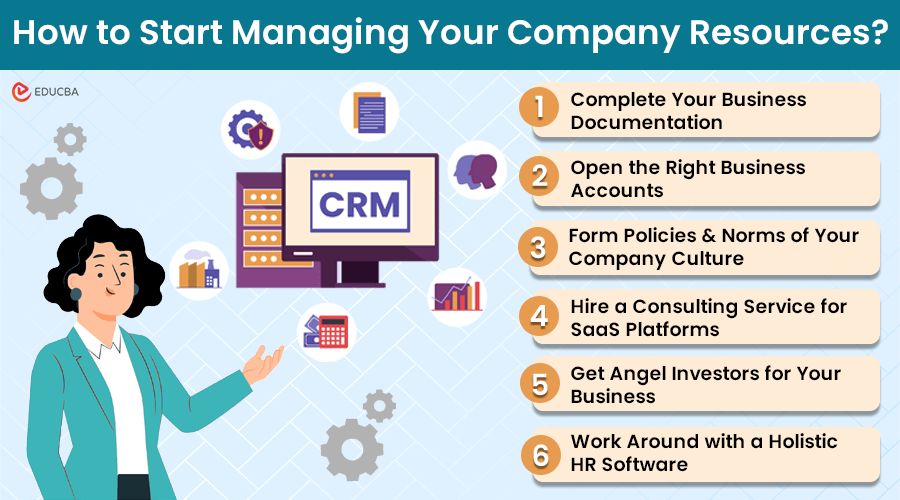
What is Company Resource Management?
Company resource management involves efficiently organizing and using everything a business needs to operate. It includes money, materials, equipment, and people. The goal is to ensure that the company uses everything effectively to achieve its objectives without wasting resources.
Whether you are a beginner or already in business, mastering effective resource management is key to increasing the profits of your business and becoming a successful entrepreneur.
List of Essential Company Resources
Effectively managing various company resources is essential for any business, regardless of size or industry.
Here are some key resources that require careful management:
- Money: It includes earnings, expenses, investments, and financial planning. Understanding where your money comes from and where it goes ensures financial stability and growth.
- People: Managing your workforce involves hiring, training, and retaining talented employees. It is about optimizing their skills and roles to maximize productivity and satisfaction.
- Time: Efficient time management ensures that tasks are completed on schedule and keeps priorities clear. It is crucial for meeting deadlines and maximizing operational efficiency.
- Energy: When managing resources, consider employees’ physical and mental energy. Providing a supportive work environment and promoting a good work-life balance can boost productivity overall.
- Discretionary Efforts: Encouraging and recognizing extra efforts beyond regular duties can boost morale and contribute to organizational success.
- Compliance: Adhering to legal and regulatory requirements ensures operational continuity and protects your business from potential penalties or liabilities.
- Business Documents: Proper documentation and record-keeping are essential for tracking transactions, contracts, and other critical business information.
- Tools: Utilizing appropriate tools and technologies enhances efficiency and supports business operations across various functions.
- Tasks or Goals: Clearly defined goals and tasks help align efforts and resources toward achieving strategic objectives.
How to Start Managing Your Company Resources?
Starting to manage your company resources effectively involves several key steps:
1. Complete Your Business Documentation
To legally operate your business, it is crucial to register your business operations with the appropriate authorities. Make sure to submit all necessary documents to the registrar promptly and accurately. If unsure, consider hiring a company secretary for expert guidance to streamline the process and avoid delays in officially starting your business activities.
2. Open the Right Business Accounts
Look for a small business savings account provider that offers free net banking services and opens with no initial balance requirement. It helps reduce the financial strain on daily operations. Check the annual or quarterly fees associated with the account and compare them with those of other banks. Ensure the security of online transactions is robust to safeguard your funds during crises. Understand the procedures for closing accounts, managing overdrafts, and applying for loans beforehand. Aim for an account that offers comprehensive features to streamline your business operations from the start.
3. Form Policies and Norms of Your Company Culture
Establish employee policies to prevent future issues before managing your hired employees. Consult a company secretary for expertise in drafting contracts and bylaws and staying updated on corporate regulations. They facilitate smooth internal communication with stakeholders from the outset.
4. Hire a Consulting Service for SaaS Platforms
Managing company resources simultaneously can be challenging and requires careful attention, supervision, and patience, especially when making strategic decisions for business expansion. Consider engaging a reliable ERP Consulting vendor or service. They offer scalable, transparent, secure, and fully integrated SaaS solutions.
Consulting these experts helps you identify the best SaaS platform to leverage. They partner with various apps and platforms, enhancing your business’s productivity and performance.
Tracking the profitability of each software or service over time can effectively optimize costs. ERP experts are invaluable in optimizing solutions as your business expands.
5. Get Angel Investors for Your Business
Get your finances for your business regularly. Understand your investors well and engage with them closely. Participate in startup programs to secure funding early on. Attend networking events to meet investors and collect their contact details. Stay in touch via email marketing and calls. Research online to learn about their investment interests. Study their profiles and portfolios to find those suitable for your business. Prepare a business proposal to pitch to them and negotiate for funding. Clearly demonstrate your company’s purpose and how it can solve significant problems profitably. This clarity will attract investors to your business.
6. Work Around with a Holistic HR Software
Adopt fully integrated HR software to ensure comprehensive management of your employees, their goals, tasks, timesheets, contributions, and engagement. This software gives you a holistic view across multiple modules.
Identify profitable projects and determine if any employees require a Performance Improvement Plan (PIP). Manage contacts and new hires efficiently within the HRM software, automate salary calculations, and streamline approval processes.
Integrate AI and advanced technology into your HR software to optimize efficiency. It will enable smaller teams to manage large companies effectively, reducing hiring costs and maximizing tool utility.
Your decisions become swift, accurate, and data-driven by obtaining real-time insights from various modules consolidated into a single dashboard. It enhances business operations, keeps processes on track, and opens doors to new opportunities.
Final Thoughts
To effectively manage company resources, one should utilize intelligent HR software, seek expert advice, ensure timely compliance, and master people management skills. As an employer and business owner, prioritizing profitability while delegating tasks and strategizing operations is crucial. Regularly updating business documents or outsourcing them to a company secretary is also recommended. By diligently performing these tasks, individuals can gain the expertise to manage business resources like seasoned professionals.
Recommended Articles
We hope you found this article explaining company resource management useful. Here are other similar articles you can read.
